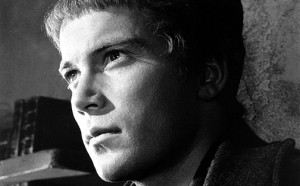The Brothers Karamazov

I started The Brothers Karamazov by Fyodor Dostoevsky when I was 14. I read the first chapter and I set it aside for four years until I was ready to read the rest. Then, by golly, I ripped through it and was placed in awe by this man’s mastery of the art of writing.
I’m not a dogmatic guy, but quite frankly I’m a little uneasy about having someone teach literature who is not familiar with this book. I think it would be a little like a doctor who hasn’t heard of Lyme Disease.
Crime and Punishment, I wouldn’t mind if they skipped that, or just read the Cliff Notes. It’s mostly mental, and it tries too hard to prove a point. And War and Peace has a lot of blather in it that nobody needs to read. Even Anna Karenina; I confess I haven’t read that myself.
But The Brothers Karamazov is not just a work of Russian literature; it is a work of world literature so powerful it influenced everyone — Ernest Hemingway, James Joyce, Virginia Woolf — except Nabokov, who said it was full of platitudes.

If you haven’t read The Brothers K, you’re lucky, because now you can. You get to meet the bastard Smerdyakov and Stinking Lizaveta, and a host of other lovable characters.
Did you know it was a blockbuster movie in the US starring Lee J. Cobb, Yul Brynner, Richard Basehart and an unknown named… well look at the photos and guess who played Alyosha, the simpleton who later got his own book, The Idiot.
I’ll give you a hint: he has also portrayed an intrepid starship captain and a horny lawyer named Denny Crane.

August 14, 2010 @ 11:34 pm
I LOVE the brothers karamazo. I dont know how he does it , but fyodor really makes me feel like i have each of the 4 brothers inside me at every moment. what an incredible book. i would love to follow your blog from now on, and take a look at mine, at let me know if you enjoy my nonsensical ramblings 🙂
August 25, 2018 @ 9:19 am
There is nothing simple about Alyosha. Like Prince Myshkin in The Idiot he sees, takes in, and discerns the hidden intentions and the spiritual condition of those he encounters and, with his own peculiar spiritual gift, transforms and renders them back as Love. Read closely his “apotheosis” which begins with him on his knees at the coffin of Father Zosima and ends with him “rising up a fighter.” Simple? We should all be so simple.